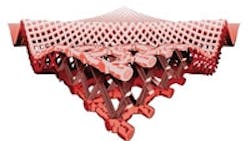There's a lot to be said for "living in the moment," but for a manufacturer looking to be around for a long time the philosophy presents some challenges. Developing products to solve tomorrow's problems requires forward thinking and long-range planning, which can be hard to find time for when dealing with the immediacy of today's needs.
It's a realization that helped spur Dow Corning's launch of its Business & Technology Incubator (B&TI) initiative in 2001. The manufacturer describes the incubator as "the cornerstone" of its ability to introduce next-generation silicon-based products and technologies. It's here that Dow Corning determines its R&D focus by examining emerging "mega-trends" as well as novel branches of silicon science, and looks for new business opportunities. One project currently in the incubator's portfolio is a silicon-based product with the potential to remove selected targeted compounds from liquids, such as pesticides from drinking water.
The incubator helps address the question of how to be innovative and agile in a company the size of Dow Corning, says Dan Futter, B&TI executive director. "We determined that the best way to do that was to form an incubator to create the time and space for our people to be creative; to have the time to think about new business models, about how you go about new technologies, and the type of relationships you need to make those things happen."
Dow Corning's incubator includes a fixed staff representing multiple disciplines, from R&D and supply chain professionals to finance and marketing. Resources also may be borrowed from other businesses if specific content knowledge is required.
Incubators face a potential pitfall, one Dow Corning has worked hard to avoid. "If [incubators] fail, it's often because they get so divorced from the current business . . . that there's a disengagement and their sponsors fade away," Futter notes. "You have to retain that engagement and patience as you're developing businesses."
Dow Corning's strategy to avoid that disengagement is to align about half of the B&TI's portfolio with Dow Corning's growth business, which is the incubator's main internal customer. The portfolio's other half is more free-ranging, Futter says. Even within the alignment to current business, the incubator's focus is on significant departures from existing products, not on incremental improvements. The incremental improvements occur within the business units.
"Our job is to think about the businesses they [business units] wouldn't capture with their lens, to go beyond what they could achieve," Futter says.
The Dow Corning incubator does not have its own discrete building, but instead shares space with several other of the company's businesses. "I'm a bit torn about that actually," Futter says. The B&TI's director said it would be nice to have a discrete building "that shouted 'incubation' when you walked in, but then the risk you run is being divorced from the current businesses that fund you and that will ultimately be the home for what you do."
See Also
About the Author
Jill Jusko
Bio: Jill Jusko is executive editor for IndustryWeek. She has been writing about manufacturing operations leadership for more than 20 years. Her coverage spotlights companies that are in pursuit of world-class results in quality, productivity, cost and other benchmarks by implementing the latest continuous improvement and lean/Six-Sigma strategies. Jill also coordinates IndustryWeek’s Best Plants Awards Program, which annually salutes the leading manufacturing facilities in North America.
Have a story idea? Send it to [email protected].

